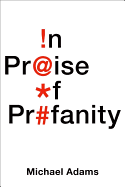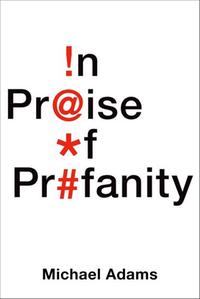
 Linguist Michael Adams is a historian and lively defender of the English language. In Slang: The People's Poetry, he delivered an examination of how colloquial speech is an inventive, linguistic rebellion against the mainstream in its ability to irritate and shock. In Slayer Slang, he showed how youth culture and contemporary trends--in particular, the critically acclaimed, popular TV program Buffy the Vampire Slayer--can push the boundaries of the English language. And in From Elvish to Klingon, he explored the distinctive grammar, vocabulary and usage in invented languages from Tolkien, Star Trek and the dystopian novels 1984 and A Clockwork Orange.
Linguist Michael Adams is a historian and lively defender of the English language. In Slang: The People's Poetry, he delivered an examination of how colloquial speech is an inventive, linguistic rebellion against the mainstream in its ability to irritate and shock. In Slayer Slang, he showed how youth culture and contemporary trends--in particular, the critically acclaimed, popular TV program Buffy the Vampire Slayer--can push the boundaries of the English language. And in From Elvish to Klingon, he explored the distinctive grammar, vocabulary and usage in invented languages from Tolkien, Star Trek and the dystopian novels 1984 and A Clockwork Orange.
Adams never shies away from the provocative, and his imaginative, anti-academic approach holds great appeal. In keeping with his expertise in the history, theory and practice of lexicography, he now offers In Praise of Profanity, an illuminating, creatively presented exposition about the use of expletives--from four-letter words to latrine graffiti--throughout the ages. His aim in writing about language we're not supposed to use is to "illustrate profanity's very humane aspects, how expressive language participates in the human comedy and the human tragedy, and most often the human tragicomedy." By blending literary and cultural criticism, Adams sets up a defense of profanity that shatters over-simplified taboos, while outlining and illustrating stylistic motivations and the many valuable benefits expressive swearing can offer via the personal, emotional, societal and aesthetic.
Attitudes about using bad language are paradoxical and persistent, as the "functional need to express powerful emotion is inherently human" and goes all the way back to Chaucer's often crude and bawdy Canterbury Tales. Adams states that "were there ever a time to admire profanity, it would be now," believing that society is enmeshed in a profuse and profligate "Age of Profanity," where lines of decorum have been stretched, and it has gotten harder to temper or control cursing because it bombards and permeates the human psyche at every turn, like a wide-spread cultural disease. This is evidenced through many detailed and colorful examples Adams intersperses throughout the narrative--instances culled from ordinary, everyday conversation, news stories, the political arena and mainstream literature, music, film and TV programs such as Modern Family, South Park and The Sopranos. Adams also probes the power of profanity, how emotive speech can serve a larger artistic purpose, and he distills and deconstructs the ways in which profanity is often camouflaged via euphemisms.
By weaving together history, linguistics and some fascinating psychological analyses in an accessible, entertaining fashion, Adams presents an intriguing case for his defense. Readers won't necessarily come away from this book swearing a blue streak. But the next time they're compelled to light up with an expletive--or they hear someone cursing up a storm--they'll more than likely remember Adams's thought-provoking, contemporary investigation that casts a new light on the darker side of the English language. --Kathleen Gerard, blogger at Reading Between the Lines
Shelf Talker: A linguist of the English language presents an entertaining, well-researched examination of the role of profanity in society.

